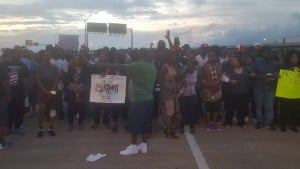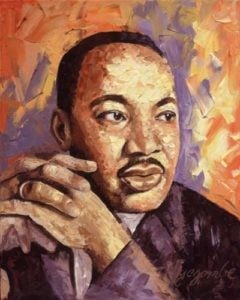 There is a story circulating in social media that Jonathan Butler, the graduate student who went on a weeklong hunger strike at the University of Missouri in protest of racist conditions at the school, is a person of means. In an attempt to shame him and critique the movement, there are reports that his family is a “prominent family” in Omaha, Nebraska. According to the St. Louis Post- Dispatch, Butler’s father, Eric L. Butler, is an executive vice president for sales and marketing for the Union Pacific Railroad and according to filings with the Securities and Exchange Commission, his 2014 compensation was $8.4 million.
There is a story circulating in social media that Jonathan Butler, the graduate student who went on a weeklong hunger strike at the University of Missouri in protest of racist conditions at the school, is a person of means. In an attempt to shame him and critique the movement, there are reports that his family is a “prominent family” in Omaha, Nebraska. According to the St. Louis Post- Dispatch, Butler’s father, Eric L. Butler, is an executive vice president for sales and marketing for the Union Pacific Railroad and according to filings with the Securities and Exchange Commission, his 2014 compensation was $8.4 million.
Many who already opposed Butler’s hunger strike and all the activities surrounding the protests are now criticizing him. There is already a YouTube video up declaring that Jonathan Butler is a fraud and as you can see from the following tweets, some were not too happy that Butler comes from a family with money. They argue that since he comes from money, he is and cannot be oppressed.
So jonathan butler says hes obpressed! And white privlige! His family is rich as fuck! Wow. Wat a fucking lieing low life. #karma
— Don (@SportsTalkwDon) November 12, 2015
Better yet Jonathan Butler screaming about black oppression and how privileged white people are…has a family net worth of $20M — Jon Snow (@WatchOhiosWall) November 12, 2015
Jonathan Butler complains about white privilege and oppression, yet comes from a family worth millions. Seems like he’s doing just fine
— Ryan (@BigSlaus) November 12, 2015
White people are privileged? Feeling oppressed? Jonathan Butler (#MizzouHungerStrike) is from a VERY wealthy family! https://t.co/AgnkIIgkyf — Laurie D. (@LolosInTheHouse) November 12, 2015
Jonathan Butler can go fuck himself running. The little bitch comes from a family where his father is worth $20M yet talks “White Privlage.”
— Andrew Muller (@AndrewTMuller) November 12, 2015
However, this is what makes this story even better. I will not focus on the obvious her—that these and other people like them do not understand or even care to understand what systematic racism is and how it functions. The very fact that Jonathan Butler can come from money; have wealthy parents, be educated, enrolled in grad school, in short, have all the trappings of respectability and still have his humanity questioned and denigrated on a regular basis, speaks to why he needed to take the action that he did.
But for me the larger story is that he did take action despite the trapping of respectability. Instead of turning a blind eye toward the inequalities he saw and felt; instead of saying that “this is not my problem,”; instead of talking about “those people” who were protesting as if their grievances were not his own; instead of hiding behind his money and insulating himself around others who would support his inaction, instead of that, Jonathan Butler stood within the African American resistance tradition and put his body on the line. Again, for me, this is the larger story because while we celebrate this action and celebrate the folks who stood and protested, we know that everybody did not stand. For some, fear took hold, for others, the risk was too great. But for many, this cause was not their cause. This action had nothing to do with them. This protest was silly and not respectful. Many who have the same trappings of respectability as Jonathan Butler elected to hide behind their illusion of inclusion—that if they continued to act, do and be right, that somehow, injustice will not come knocking on their door.
But maybe some of us are angry with Butler for another reason. Sure, while many of us applaud Butler’s actions, those same actions calls us to do is to examine ourselves. What are we doing? What have we done? Many of us are content to click the share or like button or hit the retweet button, but how many of us are willing to put our bodies on the line? How many of us are willing to spend the night with the next “Jonathan Butler” who decided to “camp out” in protest? Many of us hide behind our theories of social movements and talk about activism only in the abstract, but how many of us are marching, screaming and shouting? How many of us are willing to speak up and speak out against the injustices we see on a daily basis?
Indeed, what Jonathan Butler reminds us is that we can no longer hide behind or insulate ourselves around our respectability–because in the end, it simply will not save us. Jonathan Butler understands this. The question now is do we understand? What is our excuse now?
Andre E. Johnson is the Founder and Managing Editor of R3












